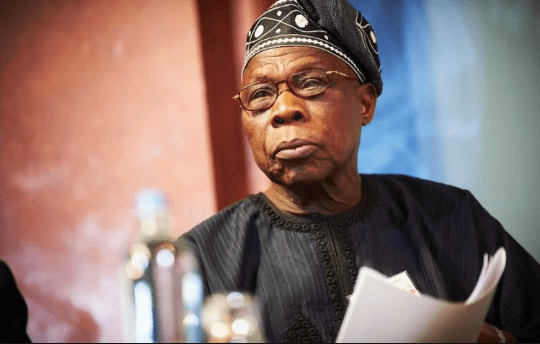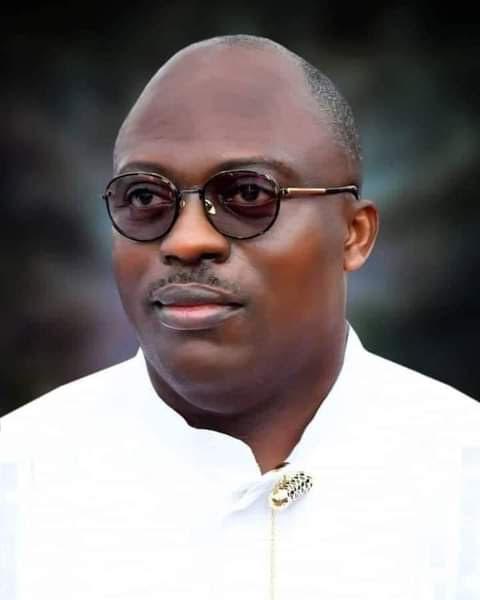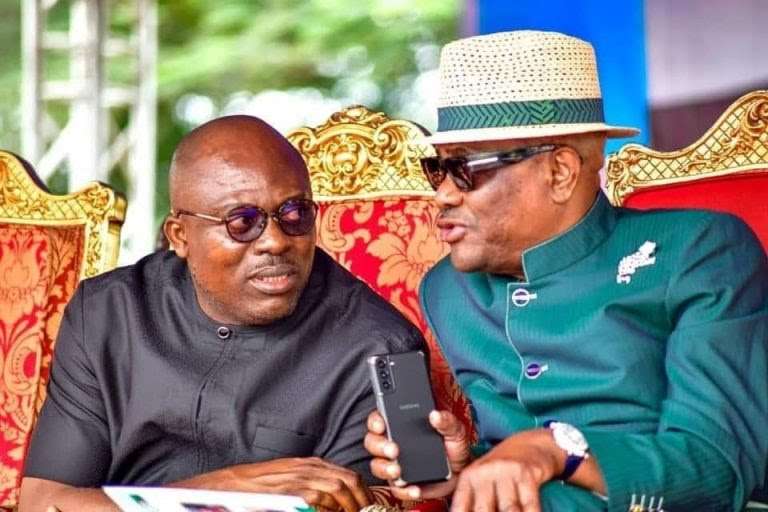Politics
Obasanjo Blames Loss Of Values For Democracy’s Failure In Africa

Former President Olusegun Obasanjo has said democracy as a system of government has failed on the African continent because it doesn’t align with our values, culture, and way of life.
Obasanjo said this while making a presentation at the 60th birthday colloquium in honour of former Deputy Speaker of the House of Representatives and one-time practising Imo State Governor, Emeka Ihedioha, in Abuja, yesterday.
The former Nigerian leader wondered whether Africans were practising true democracy or merely adopting Western-style liberal democracy.
He argued that before the advent of colonialism, Africa had governance systems that effectively served the people; this, according to him, qualified as a democracy.
Obasanjo made reference to Abraham Lincoln’s definition of democracy as “government of the people, by the people, for the people”, stating that the system should work for all citizens, not just a privileged few.
According to him, democracy has evolved into a system where a small group of people governs over a large majority who are deprived of their rights and necessities. He criticised this model, describing it as a system that enables corruption and injustice, where those in power accumulate wealth illegally and leave the masses without recourse.
READ ALSO: Obasanjo, Atiku, Tambuwal, Peter Obi, Others Meet In Abuja
He said further, “Democracy has now become representative democracy. Today we have democracy, which is government of the people, of a small number of people, by a small number of people, over a large number of people who are deprived of what they need to have in life. Now that is not democracy that will endure. So if you are talking of democracy failing in Africa, democracy in Africa has failed.
“And why has it failed? Because it didn’t have any content, and in content, it is not Africa. It does not have any aspect of our culture, our way of life, what we stand for, or what we believe. What sort of democracy do you have, and you grab everything illegally and corruptly, and you say go to court? Even in the court, you cannot get justice,” he stated.
He cautioned that democracy in Africa is not just failing but is at risk of extinction unless it is redefined to reflect African values and serve the needs of its people.
He called for an approach that integrates Africa’s cultural and historical context to create a system of governance that truly delivers for all.
“We have to look at democracy in the context and the context of Africa. I hope that we will get to that stage so that democracy, which will deliver, will be the democracy that we will have in Africa,” Obasanjo added.
He commended the celebrant, whom he described as a determined person who was a gentleman and good-hearted even in the face of injustice done against him.
The guest speaker at the event, Bishop Mathew Hassan Kukah, equally advocated for a form of democracy which cared for all, not a few.
READ ALSO: Google Maps: Obasanjo’s Library, Abia Tower, Emir’s Palace Among Nigeria’s Top Reviewed Places
Kukah said, “Democracy is working for different people, as you can see in their outlook. There is the belief that citizens are free to rebel. There had been debate about whether the Nigerian constitution is perfect or not.
“No constitution will be better than the Bible and Koran. Yet, we are still living in sin. The problem is that, in Nigeria, the issue of Christian and Muslim prayer is not the best.
“The weaponisation of religion is a big problem in Nigeria. Democracy is a work in progress. God doesn’t discriminate between Christian and Muslim prayers. There is no discrimination. We are children of one God. If we are not treating each other rightly, one of them must be a bastard.
“Democracy and its principles are endless contestations. There are certain things God has given us which people can’t control.
“We, as Africans, inherited a system that’s not ours, but we can’t say it’s not relevant to us. There are differences between democracy in Asia and that of Africa. Singapore example. What do you make of the tenets of democracy in Africa?”
In a veiled reference to controversial judgements that have emanated from judicial officers in recent times, the clergyman said, “I feel sorry for judges. At the last election, even little me, I had people calling me, complaining, Talk to this, Talk to that. Pressure on judges to deliver justice. I agree that there’s an urgent need to clean up the mess.
“Democracy is about everything; it’s about justice. How do we know if democracy is working in Nigeria? Do we measure democracy based on the things we wish for ourselves? I recommend five books.
READ ALSO: How I Sacked My Daughter Over Lateness — Obasanjo
“The democratisation of development leads to the development of democracy.”
Also speaking during the event, a former Speaker of the House of Representatives and two-term Governor of Sokoto State, Aminu Tambuwal, zeroing in on the recent declaration of a state of emergency in Rivers State, said, “Democracy will work if the actors play by the rules. It’s a work in progress.
“Under President Obasanjo, a state of emergency was declared. The National Assembly worked together to ensure that a 2/3 majority passed the emergency.
“Each member had to vote. In this same National Assembly, we have the same constitution. What happened in the last one? We need to chase out the bad operators in democracy.”
In his remarks, Peter Obi said, “Democracy is not working in Nigeria. Everything has been knocked down. Obi: I didn’t pay a dime to retrieve my mandate.
“When I was impeached, Obasanjo called to ask about my welfare. Nigeria should imbibe the Indonesian democracy, proportional representation.”
Former Secretary-General of the Commonwealth, Chief Emeka Anyaoku, explained that the theme of the colloquium is on democracy.
He went on to trace the origin of democracy and what he and his team at the Commonwealth did to promote its cause across the globe.
READ ALSO:56-year-old Woman Remanded For N25m Visa Scam
Anyaoku said, “As Commonwealth Secretary-General, I helped members to transit to multi-party democracy. Also the collapse of apartheid administration in South Africa. Review of the 1999 constitution
“We need a new constitution to address many challenges. True federalism is the answer to the management of national issues.
“The recent coup in Mali, Niger tends to take us back. The nature of our politics and the conduct of our politicians is another problem of our democracy.
“They have become instruments of capturing political power. It’s only true, stable democratic governance that can rid our country of the crises which impede development.
“I believe that Nigeria can change this Eurocentric narrative. We are in Africa, and Nigeria has a responsibility to get a stable democracy and change the Eurocentric narrative.”
While expressing gratitude to all who attended the event, the celebrant, Emeka Ihedioha, said, “My father told me the most expensive habit is having friends. I have lived my life pursuing the cause for democracy. We should all rise to defend democracy.
“I urge all men to always speak truth to power and protect democracy. There’s life after money. I will remain who I am. For me and democracy, it is till God do us apart.”
Politics
BREAKING: Rivers Assembly Initiates Impeachment Proceedings Against Gov Fubara

The political situation in Rivers State shifted again on Thursday as members of the State House of Assembly initiated impeachment proceedings against Governor Siminalayi Fubara and his Deputy, Ngozi Oduh.
At a plenary session presided over by the Speaker, Martins Amaewhule, the Majority Leader of the House, Major Jack, formally read the notice detailing allegations of gross misconduct against Governor Fubara.
READ ALSO:FULL LIST: Approved Physical Verification Centres For CDCFIB 2025 Screening
The notice, which was endorsed by 26 lawmakers, accused the governor of actions allegedly in violation of the Nigerian Constitution.
Amaewhule announced that the notice would be served on the governor within the next seven days.
During the same sitting, the Deputy Majority Leader, Linda Stewart, read the notice of allegations and gross misconduct leveled against Deputy Governor Ngozi Oduh.
Politics
[BREAKING] Fubara Vs Wike: Tension As Rivers House Of Assembly Suddenly Resumes Plenary

Rivers State House of Assembly will resume plenary today, bringing forward its earlier scheduled return date of January 26.
According to DAILY POST, the sudden resumption comes amid the ongoing political rivalry between Governor Siminalayi Fubara and his predecessor, Nyesom Wike, Minister of the Federal Capital Territory.
READ ALSO:Fubara: Mistakes Of 2023 Will Not Be Repeated In 2027 – Wike Vows
Recall that majority of the members of the Rivers State House of Assembly are loyal to the FCT Minister, who have sworn to work against Fubara in 2027.
Tension arising from the power struggle between Wike and Fubara has created uncertainties and anxieties in the oil rich Niger Delta state.
Details to follow…
Politics
Rivers: Fubara Cancelled 10,000 Jobs I Initiated For Youths – Wike Alleges

The Minister of Federal Capital Territory, FCT, Nyesom Wike, has accused Governor Siminalayi Fubara of Rivers State cancelling an employment process undertaken by his (Wike’s) administration which engaged 10,000 youths of the state.
Wike made this allegation on Wednesday at Ahoada main Town, during the ‘Renewed Hope Family thank you visit’ to Ahoada East Local Government Area.
He said his administration had employed 10,000 youths into different sectors of the state’s economy, but regretted that Fubara, his successor, sacked the beneficiaries.
READ ALSO:2027: Watch Out For My Anointed Candidate – Wike Tells Supporters
He slammed Fubara for claiming the construction of Ahoada-Omoku and Emohua-Kalabari Road, which he said he had made 70 percent payment before handing over, describing the governor as “a bad child”.
“When I decided to dualise this Ahoada road, people thought it was impossible. But by the grace of God, today, Ahoada East, Ahoada Town, is coming back to be the city it is supposed to be. When I was a narcissist, I finished phase one of this dualisation.
READ ALSO:Fubara: Mistakes Of 2023 Will Not Be Repeated In 2027 – Wike Vows
“Then I flagged off phase two, which would end up in Omoku. The job was given the same day as the one of Emohua to the Kalabari area.
“I gave it to Julius Berger and we signed an agreement for Julius Berger to collect N4 billion every month from our IGR. The total amount of that road, and the one from Emohua to the Kalabari area, was about N80 something billion. So I said, if they collect four billion every month, that would give them 48 billion. That in two years time, they would have completed,” Wike said.

 News4 days ago
News4 days agoWhat I Saw After A Lady Undressed Herself — Pastor Adeboye

 Headline4 days ago
Headline4 days agoPROPHECY: Primate Ayodele Reveals Trump’s Plot Against Tinubu

 Metro4 days ago
Metro4 days agoArmed Robbers Shot PoS Operator To Death In Edo

 Metro3 days ago
Metro3 days agoAAU Disowns Students Over Protest

 Business3 days ago
Business3 days agoNNPCL Reduces Fuel Price Again

 Metro3 days ago
Metro3 days agoEdo: Suspected Kidnappers Kill Victim, Hold On To Elder Brother

 Politics4 days ago
Politics4 days ago2027: Rivers APC Pledges To Follow Wike’s Instructions

 Metro3 days ago
Metro3 days agoNine Soldiers Feared Dead In Borno IED Explosion

 Metro4 days ago
Metro4 days agoJoint Task Force Kills 23 Bandits Fleeing Kano After Attacks

 Metro4 days ago
Metro4 days agoGunmen Demand N200m Ransom For Kidnapped Brothers In Edo




























